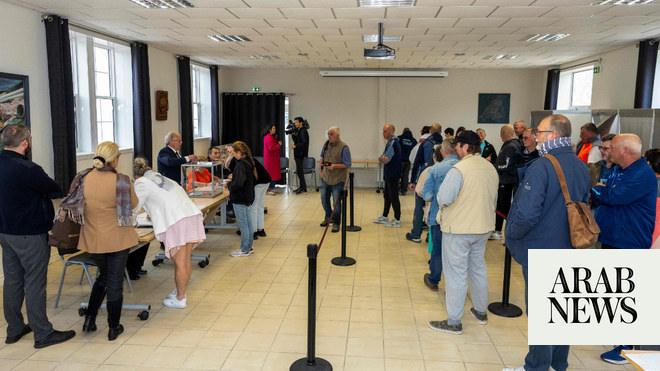PARIS: Parliamentary elections began in France on Sunday. The first round of early parliamentary elections may lead to a historic takeover of power by the far-right party of Marine Le Pen.
As Russia’s war with Ukraine continues into its third year and energy and food prices rise significantly, support for the anti-immigration and Eurosceptic National Rally (RN) party has surged despite President Emmanuel Macron’s promises not to let it grow.
Polling stations across mainland France opened at 8:00 a.m. (06:00 GMT) and will close 12 hours later, with predictions immediately following, which usually predict the result with some accuracy.
Voters in France’s overseas territories, which span the globe, cast their ballots earlier this weekend. Some 49 million people are eligible to vote.
Cassandre Cazaux, a nurse who voted in the French Pacific territory of New Caledonia, where tensions remain high after last month’s deadly riots, said the election was “decisive.”
“The turnout should be high, but I don’t know if everyone will vote,” she said.
The elections for the 577 seats in the National Assembly are held in two rounds. The shape of the new parliament will become clear after the second round, which will take place on July 7.
Most polls show RN is on track to win the most seats in the National Assembly, the lower house of parliament, although it is unclear whether the party will win an outright majority.
Turnout is expected to be high, with final polls giving RN between 35 and 37 percent of the vote, compared with 27.5-29 percent for the leftist New Popular Front alliance and 20-21 percent for Macron’s centrist camp.
If the RN wins an absolute majority, party leader Jordan Bardella, a 28-year-old Le Pen protégé with no governing experience, could become prime minister in a tense “cohabitation” with Macron.
According to government sources, Macron plans to convene a government meeting on Monday to decide on further actions.
France faces a year of political chaos and confusion with a suspended Assembly, said Mujtaba Rahman, European director at Eurasia Group, a risk consultancy.
“There has been no precedent for such an impasse in recent French politics,” Rahman said.
Macron’s decision to call an early vote after the RN’s strong showing in this month’s European Parliament elections surprised friends and foes alike and created uncertainty in Europe’s second-largest economy.
According to data released on Friday, the Paris stock exchange recorded its biggest monthly decline in two years in June, losing 6.4 percent.
In an editorial, French daily Le Monde said the time had come to mobilise against the far right.
“To give him any power is simply to take the risk that everything that has been built and conquered over more than two and a half centuries will be gradually destroyed,” he said.
Several activists from the feminist collective Femen dressed as cleaning women, wielding mops and buckets, demonstrated bare-breasted on the Trocadero in Paris on Saturday, chanting slogans against the far-right.
Separately, tens of thousands of people took part in an LGBTQ Pride march in Paris, some of them carrying banners targeting the far right.
“I think it’s even more important now to fight hate in general, in all its forms,” said 19-year-old student Themis Hallin-Mallet.
Many pointed to an increase in hate speech, intolerance and racism during the campaign. In recent days, a video of two RN supporters verbally attacking a black woman has gone viral.
Macron lamented “racism and anti-Semitism.”
He clearly hoped to surprise political opponents by presenting voters with a crucial choice about France’s future, but observers say he may have lost.
Support for Macron’s centrist camp collapsed, and left-wing parties put aside their differences and formed the New Popular Front, modeled on the alliance founded in 1936 to fight fascism.
Analysts say Le Pen’s years of efforts to clean up the image of the party she co-founded as a former member of the Waffen SS have borne fruit.
The party promised to increase purchasing power, limit immigration and strengthen public order.
The fearless Macron stuck to his decision to call elections, while warning voters that a victory for the far right or far left could trigger a “civil war.”
He insisted that he would serve until the end of his second term in 2027, regardless of which party won.

